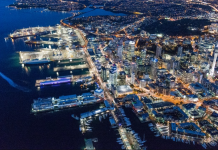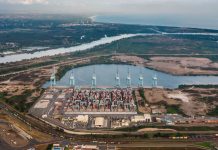The Port of Rotterdam Authority, national government and four provinces have made agreements for more secure parking spaces and charging points for clean energy along the two most important freight transport corridors heading for Germany. To this end a declaration of intent was signed by the Minister of Infrastructure and Water Management, delegates of the Provincial Executives of Zuid-Holland, Noord-Brabant, Gelderland and Limburg and COO of the Port of Rotterdam Authority, Ronald Paul.
The above-stated organisations aim to ensure that traffic and freight flows can run as flexibly as possible, particularly in the Rotterdam region and German hinterland. The aim is to facilitate a smooth, reliable, robust, secure and sustainable transport system. These corridors contribute to economic growth as well as good quality of life along the most important hinterland connections heading for Germany: East corridor (road transport via A15, inland transport across the Waal, rail transport via the Betuwe Route) and Southeast corridor (Rotterdam-Moerdijk-Tilburg-Venlo).





